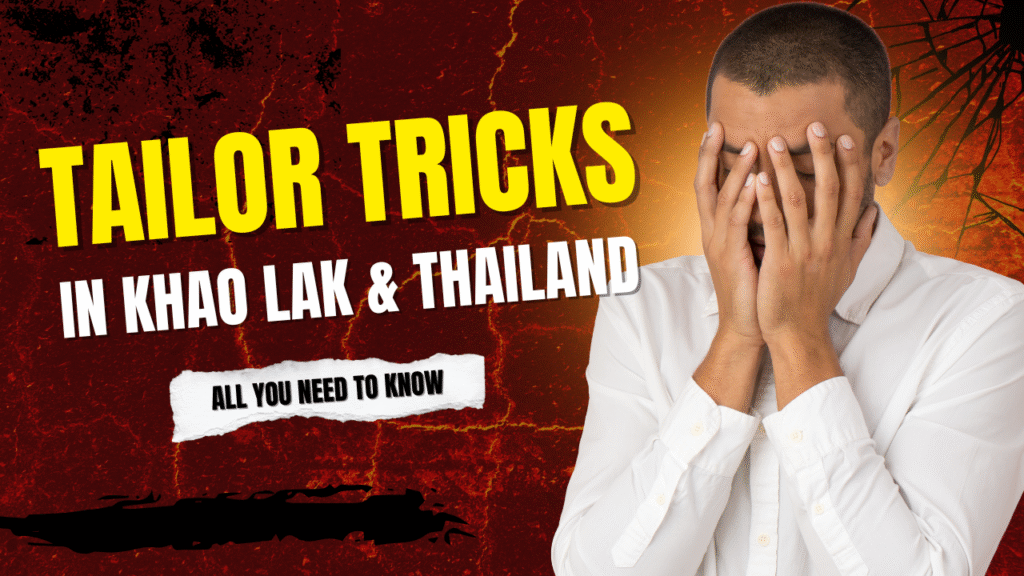Hello, my name is Mark. I would like to explain some of the common tailor tricks in Thailand, especially in popular tourist cities such as Bangkok, Phuket, and Khao Lak. If you are planning to buy a custom suit or dress in Thailand, it is important to know how some scam tailors operate and what kind of tricks they use.
Understanding these tactics isn’t just about saving money. It’s about ensuring you get quality craftsmanship and avoiding the disappointment of poorly made garments that fall apart after a few wears.

The Tuk Tuk Commission Game
One of Thailand’s most notorious scams starts before you even step into a tailor shop. Tuk tuk drivers approach tourists with incredibly generous offers—rides for 20 baht or sometimes completely free transportation around the city.
The catch? These drivers have pre-arranged agreements with specific tailor shops and receive substantial commissions for every customer they deliver. The “free” ride comes with an unspoken obligation to visit their partner shops, where prices are inflated to cover the driver’s cut.
These commission-based tailors often operate with markups of 200-300% above fair market prices. What should cost 1,500 baht for a quality shirt suddenly becomes 4,000 baht or more. The driver’s 30-40% commission gets built directly into your final bill.
Street-Side Sales Tactics That Target Tourists
Walking through popular areas in Khao Lak, Phuket, or Bangkok’s tourist districts, you’ll encounter remarkably friendly individuals stationed outside tailor shops. Their approach is carefully calculated to draw you in through a combination of charm and artificial urgency.
The Bait-and-Switch Price Game
These street representatives typically display eye-catching price boards advertising seemingly impossible deals. A custom shirt “normally 1,500 THB, today only 700 THB!” sounds fantastic until you step inside and discover the reality.
Once you’re engaged and interested, the price manipulation begins. The advertised fabric is suddenly “finished” or deemed “poor quality” by the salesperson. They’ll guide you toward “premium” options that cost two or three times the advertised price. Before you know it, that 700 baht shirt has become a 2,100 baht purchase.
The Illegal Operation Red Flag
Many of these aggressive street-front operations exist in legal gray areas or operate without proper licenses. You can often identify them by their immediate willingness to provide refunds when threatened with police involvement. Legitimate businesses don’t typically panic at the mention of authorities.
Transportation Commission Networks
The commission system extends beyond tuk tuks to include taxi drivers, private car services, and even some hotel staff. These networks can be surprisingly extensive, with commission rates reaching 35% of your final purchase price.
When a taxi driver enthusiastically recommends their “friend’s” tailor shop, remember that friendship likely involves a substantial financial arrangement. Every recommendation from transportation providers should be viewed with healthy skepticism, as their primary motivation is earning commission rather than ensuring you receive quality products.
Tour Guide Partnerships and Hidden Agendas
Not all tour guides operate with your best interests in mind. Some have established relationships with specific tailor shops and receive kickbacks for customer referrals. These guides may present their recommendations as personal endorsements based on quality and value, when they’re actually financial partnerships.
Tour guides who repeatedly steer conversation toward shopping opportunities, especially custom clothing, may be more focused on their commission potential than your sightseeing experience. Shops that survive primarily through tourist commissions rather than local clientele often prioritize quick sales over craftsmanship quality.
Modern Solutions for Finding Legitimate Tailors
Fortunately, today’s technology provides better alternatives than relying on street recommendations or transportation partnerships. Google Reviews offer insights from previous customers, allowing you to evaluate tailors based on actual experiences rather than commission-motivated suggestions.
Read through multiple reviews, paying attention to comments about quality, pricing transparency, and delivery timelines. Look for tailors with consistent positive feedback from both tourists and local customers—this indicates a business model based on reputation rather than one-time tourist transactions.
AI-powered search tools can also help identify reputable custom tailors in Khao Lak and throughout Thailand. These platforms aggregate reviews, compare pricing, and highlight businesses with strong track records for quality and customer service.
Red Flags That Signal Potential Scams
Several warning signs can help you identify problematic tailor operations before you commit to a purchase:
Aggressive street promotion – Legitimate tailors typically don’t need to chase tourists or rely on street-side sales tactics. Quality speaks for itself through word-of-mouth and returning customers.
Pressure to buy immediately – Phrases like “special price today only” or “last day of promotion” are designed to prevent you from shopping around or thinking carefully about your decision.
Reluctance to show previous work – Professional tailors take pride in their craftsmanship and readily display examples of completed projects. Shops that can’t or won’t show you their work quality should raise immediate concerns.
Vague pricing structures – Reputable tailors provide clear, itemized pricing that doesn’t change based on your appearance, nationality, or perceived wealth.
What Professional Tailoring Actually Looks Like
Authentic bespoke tailors in Thailand operate differently from the tourist-focused shops. They typically maintain established locations rather than relying on street promotion. Their customer base includes both locals and tourists who return regularly for additional work.
Professional tailors invest time in understanding your needs, taking precise measurements, and explaining their process clearly. They’re transparent about pricing, delivery timelines, and fabric options without using high-pressure sales tactics.
Most importantly, legitimate tailors stand behind their work with appropriate guarantees and alteration policies. They want you to be satisfied because their reputation depends on quality rather than volume.
Your Next Steps for Safe Tailor Shopping
Start your search online before arriving in Thailand. Research tailors in your intended destination through review platforms and travel forums. Contact shops directly to inquire about pricing and services—professional businesses will respond promptly and professionally.
When you arrive, visit multiple shops to compare pricing and quality before making any commitments. Ask to see examples of their work and speak with the actual tailors who will be creating your garments.
Most importantly, trust your instincts. If something feels too good to be true or if you’re being pressured to make immediate decisions, walk away. Thailand has many excellent tailors who build their businesses on craftsmanship and customer satisfaction rather than tourist exploitation.

